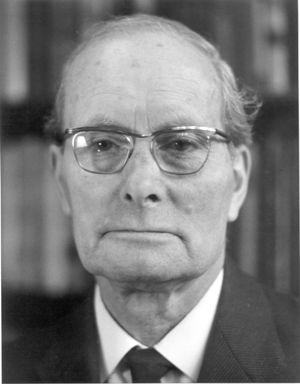Frederick George Mann, FRS
1898-1982.  Organic Chemist; Lecturer.
Organic Chemist; Lecturer.
Frederick George Mann was born in West Norwood, London, and attended Battersea Polytechnic Secondary School. Here he first developed his lifelong interest in chemistry and natural history. Invariably known to friends and family as 'F.G.', Mann enrolled in the University of London in 1913, at the age of sixteen, and further demonstrated his scholarly ability in chemistry.
During the Great War, in January 1916, he enlisted in the London Regiment although he was not called up until May 1917, when he was appointed to the Civil Service Rifles at Winchester. He witnessed gas warfare first-hand and was considered a good soldier. Having been diverted from his studies, after his demobilisation from the army he attained only second class honours in his degree at the University of London in 1919. Early the following year, however, he was invited to Cambridge by Sir William Pope, chair in chemistry, to work for a Ph.D. Mann soon became Pope's laboratory assistant, specialised in organic chemistry, and in 1923 became the first member of Downing College to be awarded a Ph.D. in this subject. He served as an assistant lecturer to Pope at Downing until 1930 when he was made a Fellow and appointed to a University lectureship in the natural sciences at Trinity College.
A keen sportsman who had befriended many Trinity Fellows as early as his student days, he would remain associated with the College for the rest of his life. In 1930 he married Margaret Reid Shackleton, a lecturer in geography at University College London. He was awarded a Cambridge Sc.D. in 1932. From the mid-1930s onwards he became most active as a researcher, authoring or co-authoring at least 270 articles over the next few decades. His research involvement in both the fields of organic and inorganic chemistry, however, had the result that his work was often underappreciated by those who specialised in only one of these fields. In 1946 he was appointed Reader in Organic Chemistry to the University (becoming Reader Emeritus in 1964) and was also appointed Visiting Senior Professor of Chemistry at the University of Hawaii.
Mann served on the Council of the Chemical Society for a few terms as well as the Council of the Royal Institute of Chemistry, of which he was vice-president from 1958-61. He also worked as a consultant for I.C.I. His most successful publication was Practical organic chemistry (Longman, London, 1936), which he co-authored with B.C. Saunders and remained in print for very many years. He was elected a Fellow of the Royal Society in 1947 although in his later years he came to feel that his work was never fully appreciated by either that society or the Chemical Society. He retired from his university teaching post in 1964.
Mann travelled less in his later years, although he did speak at conferences in Denmark, France and Bavaria and also visited the United States on a few occasions, including one lengthy visit during 1967. He continued to work at his research laboratory up until the early 1970s, when his health began to decline rapidly. Shortly after completing his entertaining memoir Lord Rutherford on the Golf Course, which he published at his own expense in 1975, he developed Alzheimer's disease. As a result, during the last six years of his life he could no longer deal with correspondence or other responsibilities, these being tasks that were now performed for him by his second wife Barbara.
A detailed review of his scientific work by I.T. Millar, as well as a list of his numerous publications, appears in Bibliographical Memoirs of Fellows of the Royal Society, vol. 30 (November 1984), pp 421-41. Trinity College Library: Mann
| Memorial inscription | Translation |
|
FREDERICK GEORGE MANN annos lii socius. Et hic et in academia lector |
Frederick George Mann was a Fellow for fifty-two years. Popular amongst the students, as both Lecturer in the College and Reader in the University, he taught and furthered the science of chemistry. He fiercely defended whatever he considered right and true. He died in 1982 at the age of eighty-four. |
Frederick George MannBrass located on the north wall of the Ante-Chapel. |
|
|
|
PREVIOUS BRASS |
|
NEXT BRASS Francis Martin |
| Brasses A-B | Brasses C-G | Brasses H-K | Brasses L-P | Brasses R-S | Brasses T-W |

